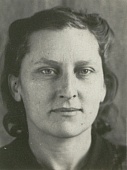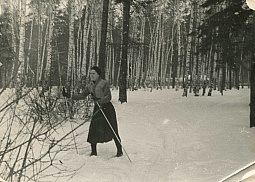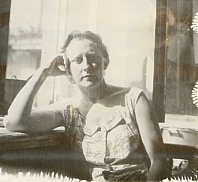Archived site
Read only

Inna Prochaska
Fathers name: Vasily Prochaska
Mothers name: Vera
Year of birth: 1919
Brothers/sisters: Yura
Studies: Moscow institute of Technology, Metallic Engineering
Profession: Construction engineer, Teacher
Childhood
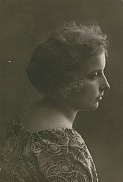
Vera - Inna's mother.
Inna Prochaska was born in Krasnoyarsk, on the banks of the great river Yenisei. She lived in a expansive wooden house with her parents, Vasily and Vera, her younger brother, Yura, and her grandmother, Yulia.
In the spring, they would watch the nature wake up, as the bright sun shone, the icebergs crashed on the river, and the first sprouts came up in the fresh wind. In hot summers they went to an island in the middle of the river to collect flowers and berries.
Inna's mother was young and beautiful. She spent much time caring for herself, for her clothes, and for the garden. The family had a wonderful garden.
Inna's father worked as an industrial engineer in a beer factory, which belonged to his mother before the Soviet revolution. His mother had voluntarily given up the factory to the government, so the authorities let her son work there. He was later dismissed.
End chapter 1
School Years
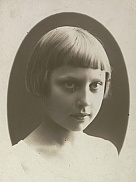
Inna as a child
When it was time for Inna to start studying, it turned out the school across from her house would not accept her, being the daughter of a "Foreign Element" of the high bourgeois. Inna's parents hired a private teacher for a year. In the second grade she was allowed to go to the public school.
By the time Inna started the fourth grade, the family moved to Tomsk. In Tomsk, they had a big house in a thicket, with berries and mushrooms, birds and porcupines. Inna had a hard time keeping secret the fact that the family owned their home. It was not only shameful at the time, but also dangerous.
When they had to give up the house, Inna was happy because there was nothing to be ashamed of anymore. They moved to live with friends of her father's and things got worse. Gradually, all their furniture was sold until they ate their dinners on a box. Her father was often traveling at night and mama cried and stopped paying attention to her clothes. At school it was announced that the country was fiercely and moving toward collectivism and it was time to establish new politics.
In Siberia, products gradually started disappearing from the markets. Hunger was knocking at the door. The family moved to the Kavkhaz, to Stavropolsk.
The first year in Stavropol was better, but then hunger arrived there too. Famished people were wandering in the streets, lying at shops' doors and staring into space with sad eyes. The body of a woman lay for a long time on the street that Inna passed every day on her way to school.
One day, Inna and her girlfriends found the blue corpse of a baby. They told their teacher, who said "There's no need to inform the police about it. There are many dead now".
Inna did not suffer hunger as much as others. This can be explained only by the ingenuity of her father, who worked in a Vodka factory. And Vodka could be traded for anything! Inna used to bring hungry fellow students for lunches at her house. The family always had 2-3 extra people at their table.
One Christmas, Inna's mother decided to put together a Christmas tree, despite the hardships and the fact that Christmas trees were forbidden as "Bourgeois Arrogance". The family covered their windows in dark curtains and started decorating the tree with stars, candies and silver rain long before the holiday.
On New Year's Day everybody was in a good mood. Inna's father was dressed up as a pirate and chased the kids around the house. Inna's mother dressed as Japanese woman, with a kimono and high hairdo. She sang and played the piano for them. Inna's brother Yura, 4 years younger than herself, climbed up on the piano stool and improvised songs. He had a phenomenal musical talent; from the age of four he could play tunes he had heard only once in the street. His talent promised great future, but his fate was different. Yura died in World War II.
End chapter 2
High School
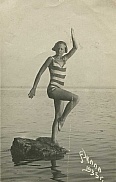
Inna on vacation
Though Inna and her classmates sung with conviction about a bright, happy future, many people suffered. Boris, Inna's uncle, returned to Russia after his studies in Germany, against everyone's advice. He was arrested and sent to the camps as "the enemy of the people" and a "German spy". The director of Inna's school had disappeared mysteriously, and so had the director of the Vodka factory. People were disappearing left and right.
As a student, Inna lived a relatively sheltered life. She liked sports, including gymnastics, volleyball, and marksmanship. Her first love was a boy named Victor, who returned her love.
In the winter, when the snow fell, Inna, Victor and the other kids from school used to go together to ride toboggans. They would climb to the highest point of the hill, all cramped up on a single toboggan, and slide down, the wind whistling in their ears, screaming with joy.
Who could have known what the future held for them? In Europe, Hitler was already taking one country after the other, and within a few years many of them would be dead.
Inna passed her final exams easily. She felt sad leaving all her friends behind, especially Victor. Within a month the family moved to a different town named "Klugu". Inna was accepted to Moscow's Institute of technology, in the Metallic Engineering department.
End chapter 3
War
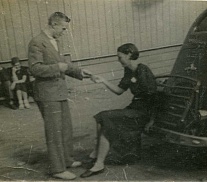
Inna and Nicolay, her husband.
War caught up with Inna during her fourth year of studies in Moscow. Molotov's grave voice burst out of the speakers all over the institute: "This morning at sunrise German aviation bombarded our cities. Everyone is required to defend our country!"
The next day the students were gathered and given assignments: some were to deliver mobilization orders, some were sent to dig trenches around Moscow, and others were to work in factories. "All for the Front", "Not a Minute's Rest" cried motivational signs from every wall. Nicolay, Inna's boyfriend, was sent to dig trenches. Inna was sent to a factory.
When Inna came back to Moscow and met up with Nicolay again, they decided to get married, unofficially, in what was called "a student marriage". One night they organized a party of their fellow students, and sitting in the candlelight, listening to the sirens and blasts outside, they toasted with Vodka and announced themselves husband and wife.
Moscow was bombarded heavily by the Germans. According to the newspapers, about 100-200 German bomber-planes flew onto Moscow, but only few passed the defense ring. Many students were enlisted and sent to the front, but senior students who were close to graduating were allowed to finish their studies in order to be sent to factories.
On October the 16th, it was announced that all the remaining students would be evacuated to the east. They were instructed to pack their belongings and go to the train station the next day. The train did not arrive all day so they were instructed to leave their luggage and evacuate on foot. Inna and Nicolay packed their belongings, clothes, conserves, bread, two cups and a heavy pot, in 2 backpacks. The group started their walk east in a long, silent file, as explosions echoed in the distance of the dark Moscow night.
On the second day, the orderly group broke up. Each person walked at his own pace. Many were getting rid of their luggage; one could see scattered pans and pots, mugs, and all sorts of kitchenware along their trail. At night they camped around small fires.
End chapter 4
Sverdlovsk
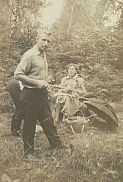
Inna and Nicolay
Inna and Nicolay were sent to a place called "Sverdlovsk", in the Ural Mountains. Upon their arrival they noticed white streets and white sky, dark wooden houses half buried in the snow, the humongous chimney of the factory letting out gray smoke, and the black neck of the shift manager in the factory.
"No soap around here", he explained when he saw their stare. "Not for wash and not for laundry".
"How can we wash ourselves after the road?" exclaimed Inna.
"You might get lucky and get some soda powder, or try cinder from the fire place", was the reply.
Nicolay was assigned to be a manufacturing supervisor in the production hall, and Inna worked as an engineer in the office. The conditions were hard, but they were allowed to eat in the factory mess hall and they got coupons for firewood. They were getting a ration of 800 grams bread a day, which they could share with the lady who rented them a room.
In the manufacturing hall, people were overworked until exhaustion. Women worked for 12 hours a day and then had to go take care of their babies. It was especially hard for the people who were mobilized from their homes. They did not have a thing of their own. They were wandered the streets, trying to exchange their few possessions for a piece of butter or a bucket of potatoes.
Inna felt she was not contributing enough to the war. She wanted to be more useful. She wanted to go to the front. She also wanted to leave Nicolay. In February 1943 she asked for a transfer to the front. When Nicolay heard this, he was astonished. "What nonsense! Always a new trick on your mind. Get it out of your head! What are you going to do in the front? Shoot people?"
"Don't worry- they will find a useful thing for me to do" answered Inna. "Actually, I shoot well, and I also speak German. You and I cannot live together. It doesn't work."
"You tried? You do everything the opposite. None of what you do is a business for women; metallic engineering, war, the front... We could have lived together if you tried to change your stubborn nature. " Said Nicolay.
Inna got up and left the room. There was no use talking to him.
End chapter 5
Prisoner camps
Inna was sent to North of Ural, to camps where German war prisoners were kept. She vividly remembered her arrival. In the deep forest, she and two inspectors rode a real Russian toboggan pulled by two grey horses. The trees shed crispy white snow on their faces as they passed. The unusual beauty of the winter forest was untouched, seemingly wild and limitless.
"Look around, Ivan Petrovitch" she said," Enjoy. It's rare to see such beauty"
"Yeah, well, this beauty is going to change soon. We'll bring the prisoners, who will cut down the forest, make paths with their feet, dirty everything around. We are bringing Italians- not Germans. Imagine!"
The horses keep running.
Inna did not work for long in this camp. She got transferred to another one near the town of Berezenky. Here she could understand the language of the prisoners- they were Russians!
"How come they ended up in the camp? Why are they prisoners?" Inna asked one of the officers.
"They surrendered to the Germans, he said. " A decent Russian soldier would not get captured alive. The last bullet is always for yourself! We put those captives through a thorough check up. There could be German spies among them."
"But why is it wrong to surrender? " Inna persisted. "There have been prisoners of war since the beginning of wars. After the war, the enemies trade them, and soldiers go back to their families..."
"Those are our orders, and it's not for us to question them", was the answer.
Inna was not allowed to talk to the prisoners, but once Inna passed through the camp and saw a prisoner sitting on a bench near his barracks. She asked him for his name.
"My name? Ivan. Ivan Doghdikov."
"You have a badge of honor, Mr. Doghdikov. Why"¦?" Inna hesitated.
"Why am I here? Don't be shy. Ask. I got the badge of honor, but later my company was surrounded. We fought until the last bullet, but we couldn't win, and so we were captured. I ran from the German prison and found myself here, imprisoned again. Now my own people don't trust me" Ivan said sadly.
The prisoners had hard lives. They worked at a chemical factory or in road construction. But after working hours life was flowing in the camp. Prisoners and local women stole joyous moments. On a warm northern night there were lovers under every bush. The prisoners didn't know what tomorrow would bring for them and the rural women didn't know if their husbands would ever come back from the front. Many didn't return. In War times people should not be judged.
End chapter 6
Married again
When the war was over, Inna went back to Nicolay. They went to the authorities and registered legally as a husband and wife.
"Now you won't be able to run whenever you feel like it!" said Nicolay, "Now you are tied up!"
In the beginning of the winter Inna got an alarming letter from Stavropol, where her parents used to live. There had been no news from them for a few years now, and Inna did not know what had happened to them. The letter was written by her Grandma and it said only "Inna,come. It's very hard for us".
End chapter 7
Stavropol
Inna took the train to Stavropol. She ran all the way from the station to her former home. A woman opened the door and directed her to another house a few houses down the road. Her grandmother Yulia fell into her arms with hugs and tears.
"What happened? Where is everybody?" asked Inna.
"They were taken by the Germans. When the Germans retreated, they took your parents with them"
- "And where is Yura?"
"The youth was sent to Germany even earlier, to work. The house was confiscated. Its only because of the kindness of our landlady we have a roof over our heads." Grandma Yulia's tears were streaming down her cheeks. Black sadness fell upon Inna. Everything went floating as she fell to the floor.
Inna stayed with her grandparents for about a year. Their house was not returned to them, as it had been seized by the Russian government.
Inna heard about much of what happened in the war from Oleg, Yura's childhood friend.
"They blame us for staying in town when the Germans entered" said Oleg, "But no one asks about the circumstances. We were taken completely by surprise. The authorities did not think of warning us. At noon a bombardment started. Everybody was outside or at work. Many died. How could we run? There were no trains, no roads. We didn't even know from which side the Germans were coming. And then the German vehicles and motorcycles appeared in the streets. The officials managed to run on their service vehicles, leaving the people to the mercy of the Germans. One needs to eat and drink. What could we do? I was enlisted by the Germans to work for them. If you only knew the things I saw. People can be so cruel. Russian citizens were coming to the German headquarters to inform about Russian partisans for small personal gain. I knew a Russian man who approached a Jew that was hiding in an attic, demanding that the Jew give him his boots and his fur coat. He said to him: "The Germans are going to shoot you anyway. If not today, then tomorrow. It's a shame the boots and the coat will go to waste."
"And did he give him the goods? "
"Yes, he did, and later he was shot together with everybody else. The Germans took all the Jewish people to the gorge outside the city and shot them." "There were people who did good things too." Oleg continued, "People who did everything to save another life, even at the risk of their own, hiding Jews or partisans."
At that time, one couldn't travel the country without approval documents from the authorities. A person would be required to get an invitation from the place he wanted to go to. Inna sent an invitation to Nicolay. He arrived to live with them, but very soon was enlisted to the army. Inna was very upset, as she was a few months pregnant. On the day of the departure, she stood in the crowd of women on the train platform, in tears. Nicolay hugged her and said "Now I am not afraid to die, I know I have a successor".
End chapter 8
Taganrog
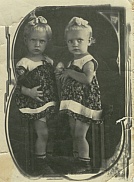
The twins- Vera and Tanya
After Nicolay left, Inna asked to be transferred to another city, where she could work in metal engineering. Her request was approved and she moved to the metal factory in Taganrog.
Inna planned to invite her grandmother and grandfather to live with her once she got an apartment, but soon she received a telegram that her grandfather had died. It was the first death she had experienced. She sat at the table, put her head down, and cried. All of a sudden she felt a sharp pain in her belly. An hour went by, and the pain got stronger and stronger. In the morning she asked her landlady to call for a car to take her the hospital.
Inna gave birth to twin girls, Tanya and Vera. She was horrified! How would she manage? She was alone in a new town. She sent the news to Nicolay in a telegram. He replied with a telegram and a package.
Her grandmother Yulia arrived in the dead of winter, when the frozen tree branches jingled as they move in the wind. Life was hard, but they managed. Inna worked in the factory and Yulia looked after the girls.
At the end of the war, Nicolay was granted leave for a few days, and came home on an unexpected visit. He happened to arrive on a night when Inna and some colleagues from the factory were enjoying free tickets to the theater. It was the first time she had ever left the twins at night. Inna could not concentrate on the show. She couldn't stop worrying about her twins, so she left after the first act. She walked in the house and saw Nicolay.
"Where have you been?" he demanded.
"I went for the theater with my colleagues."
"Yeah? So how come you are home so early?"
"I left in the middle of the show. You can ask at the factory tomorrow, if you don't believe me. Did you see the girls?"
-"I've seen the girls" Nicolay said. "I don't think they look like me."
The quarrel went on, and Nicolay slept on the sofa that night.
In the morning he got up and left. "You don't need to see me out" he told Inna.
The year was 1947. The war had ended. Nicolay came back and continued his studies. Inna had a job as an engineering teacher. Financially, life was hard. They often went without lunch, even without bread. Like everybody, they got a piece of land outside of the city to grow a vegetable garden, but neither Inna nor Nicolay had time to travel out of town to care for it.
"I am not going" said Nicolay" I am studying for my Master's. I cannot waste time on those kinds of things"
"I'm falling off my feet", cried Inna "everything falls on me-- the twins, the house, the garden"
"Okay, I can help you with the garden", said Nicolay, "but the other stuff is woman's work."
"I can't do it all. I fall asleep on the table every night, trying to prepare for classes; I can't go on like this..."
It was another bitter fight between them.
"You are so selfish ", cried Inna, "I can't stay here with you, and I won't! I'm leaving."
"You are leaving?" yelled Nicolay, "Again? How many times?"
"I don't know how many times, but this is the last time".
End chapter 9
Ramienki
Inna didn't have many options. Where could she go with two girls? She finally asked Nicolay's parents to send her an invitation.
Nicolay went to a Sanatorium. "He gets to rest again" she thought. "And me, I never get to rest." Inna quit her job, packed a few belongings, and took the twins and grandma Yulia to start on the journey north. Things were fine until they reached Kalinin, if not counting the fact that their suitcase containing the food was stolen. It was 75 kilometers from Kalinin to the village where Nicolay's parents lived. In the central station, Inna found out there were no busses since the roads were blocked by snow. Inna searched the station until she found a truck going their way.
-"Please take us with you, I will pay whatever I have", she begged the driver.
""No", he said,"It's a not about the money. It's too risky. The roads are bad, the snow is heavy, and it's freezing cold."
Inna's eyes well up with tears." But what is my other choice? We cannot sleep on the station's floor..."
The driver agreed and they commenced their journey. The roads were bad. The snow kept falling. They had to stop many times. The engine worked and the wheels were turning, but the truck stayed in place. The driver had to get out and, place rugs or boards under the wheels and push the truck. This happened again and again.
Finally they arrived safely in Ramienki. Nicolay's parents lived just a few kilometers away. That night, Inna got permission to sleep in the restaurant kitchen, where there was heating. In the morning Nicolay's father came with carriage and two horses.
A day after their arrival, the twins' temperatures rose sharply. A doctor was called and diagnosed Pneumonia, and told Inna that the twins need antibiotics. There were no antibiotics around. A battle for the twin's lives had begun. They had access to only the most primitive medicines: Aspirin, hot milk, and mustard pads. Tanya recovered quickly but Vera did not. Every day her condition got worse and worse. She couldn't even raise her head, and couldn't eat anything at all. Inna held her in her arms and her heart was torn in agony.
"If she dies, I won't be able to live. It will be my fault, only mine. I put her through a snow storm. No, God, this cannot happen", Inna thought.
Vera was so sick she couldn't move at all. Grandma Yulia offered to heal her with peasant methods. "I will cover her with sour dough. This will pull out her temperature" she said. By night time Grandma Yulia smeared a towel with sour dough and wrapped Vera with it head to toe. Inna prayed. "Dear God, just make her live! It's the only thing I'll ever ask from you. Help me; it was my fault. Punish me and not the child". In the morning Vera moved and asked for a drink. She felt better. She survived.
The days followed, one after another. They received a package from Nicolay, with products, medicines, sugar, and candies. That evening they had a feast of porridge with fresh milk and sugar.
"What tasty milk!" said Inna.
"Oh, it used to be much better" said Nicolay's mother. "We used to have our own cow. Her milk was like whipped cream. The authorities confiscated her and took her to a Kolkhoz. We did not get another cow. And our cow, "little star" was her name, could not get used to life in the Kolkhoz. She used to run from the Kolkhoz and come back here; she would stand by the yard gate and moo with tears in her eyes. And I stayed in the house, and cried too. I'd give her some bread, caress her, and send her back to the kolkhoz. She suffered there. Finally, they slaughtered her."
The days became warmer and sunnier. The snow became soft; the ice on the trees melted and dripped. Inna started to think about what to do next, and where to go. Nicolay wrote her one letter after another, demanding that she leave the girls with his parents and join him in Taganrog immediately.
End chapter 10
Taganrog again
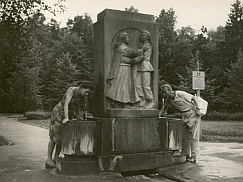
Nicolay and Inna
Finally Inna succumbed. She traveled to Taganrog and Nicolay was happy to meet her. They made peace and brought the girls and Babushka Yulia to live with them.
Inna found a job as an engineer in one of factories.
Life was hard financially. Their money would run out before the end of the month and often they would eat only cabbage and potatoes for the last week of the month. Nikolay and Inna went to work hungry and left the little they had to the girls and babushka Yulia.
"We cannot live like this" Said Nicolay. "We have to think of a way to make our lives better. I will go to Moscow and continue my studies. Then I'll have a bigger salary. Two or three years without me will go unnoticed. I will be sending you money and packages."
In the autumn, Nicolay left for Moscow. He finished his studies as planned and got a job at a scientific research institute in Moscow.
He arrived in Taganrog, and the meeting with Inna, Tanya, and Vera was very happy. They were allocated and apartment in a village near Moscow, but were promised another one in Moscow in 2 years. Meanwhile the village near Moscow was good enough for them.
End chapter 11
Sasha
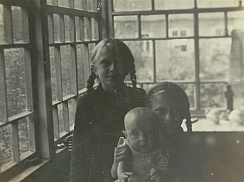
Vera, Tanya, and the baby Sasha.
Inna read a newspaper ad about a job opening as a teacher in the military institute, teaching engineering and drawing. She applied and got the job. It was a challenging demanding job, but it gave her satisfaction.
The winter was over with its storms and frosts. Spring was there with running water in the streams and bird singing. Inna got pregnant again and Nicolay wanted her to have an abortion.
"Two kids are enough", he said "We cannot afford another one. It's too much work".
"I want another one. I want a son." Inna was determined." And anyway I'm the one who does all the work with the kids."
Nicolay insisted. "So what if you want a son. I'm telling you for the last time: if you are keeping this baby I'm going to leave you, this time for good. You will be left alone."
"Okay then, leave. My children are more important to me than you, and more than any man, for that matter. I'll be left alone. I'll survive".
"You are always just arguing with me for the sake of argument! You're not thinking clearly about the situation. I'm sure when they'll find out at your work that you're pregnant they'll fire you".
"Let them fire me. My decision is final".
Nicolay was fuming. He did not come back home for days in a row. In the winter he took a long vacation and went to a sanatorium to "calm his nerves".
"If Inna doesn't listen to him- let her take care of herself." He reasoned. Before he went he chopped enough firewood for them for the rest of the winter and arranged with the neighbor boy to fetch them water. Inna, the twins and Babushka Yulia were left alone.
Inna was taking the tram every day to the city, standing up with the rest of the passengers for an hour, working and teaching, fetching products for the household, and in the evenings spending time with the girls, teaching them to draw and to sew.
When she felt the time was close she went to the hospital and within a few days gave birth to a healthy son. A package came from Nicolay, with a note: "Congratulation on the birth of the son. Eat a lot, so you'll have enough milk."
Inna and Sasha ( Alexander), the newborn baby, came home on a freezing cold day. Nicolay took him in his arms with care and love. After her maternity leave, Inna went back to work.
End chapter 12
Khrushchev speech
One day at work, there was an announcement: "Today after the classes are over everybody is asked to stay. We are going to read aloud parts of Khrushchev's speech at the convention of the Soviet communist party, about the implications of Stalin's personality cult." Khrushchev's words were like a bucket of cold water: prisons, camps, torture, fabrications. All this was done by our people? All this in our communist country?"
From the document: "The investigations procedures were violating all the Soviet laws. Under torture, citizens were forced to sign documents that declared their guilt, documents that were pre-written by the KGB employees. Thousands of innocent communists died s a result of those fabrications." Inna's head started spinning. She felt nauseous. She stopped understanding the speaker's words. "And I believed! I believed in the integrity of the communist party."
First, there was a deadly silence when the speech was over. Then everybody started talking at once.
"And we cried when Stalin died. I guess you cannot believe anyone anymore..."
"Well, many did not cry, many did not believe in Stalin in the first place. They were happy when he died. They knew and understood everything."
Inna came home in tears and told Babushka Yulia about the speech and the following conversation.
"My Dear", said babushka Yulia," You can believe only in the God above".
One spring, when Tanya and Vera were 11 years old, Inna read in a newspaper about a school in Moscow with a very strong art department. There were entrance-exams and many candidates. Inna prepared Tanya and Vera, working with them for a few months on sketching and sculpting. The girls were admitted to the school.
It was a boarding school where the student came home only on weekends. "Tanya and Vera are away from home," thought Inna, "but it is good for their future."
End chapter 13
Babushka Yulia
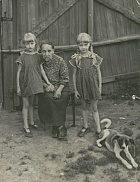
Babushka Yulia with Tanya and Vera and our dog.
In the middle of teaching a class, while explaining an exercise on the board, Inna felt a sharp pain in her heart. She breathed deeply and made herself continue the class. "I'll go home right after this class and relax", she told herself. She went home, which took two hours, on the tram, the bus, and a stop at the store. There was still more work waiting for her at home. Inna stepped into the yard and immediately noticed there were no lights on in the house. Her heart skipped a beat.
Her neighbor appeared "Inna Vasilivna"; she said "Don't get scared. Your Babushka Yulia died."
Inna fell to the floor, murmuring "Babushka, Babushka!" "Sasha!" She jumped up to hug her son. "Oh, my poor boy, you were alone...Oh, Sasha, our Babushka is gone". What a woman she was- always taking care of others, giving her love and her heart to her daughters, her granddaughter, and her grand-grand children, never asking for anything in return.
End chapter 14
Moscow
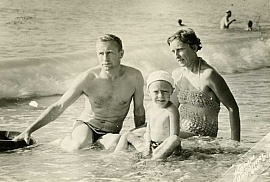
Nikolay, Inna and Sasha
Six years had passed since they left Taganrog. Finally, they got their apartment in Moscow. For only 15 rubles a month, they had 2 rooms, a shared kitchen, their own bathroom and bathtub, a trash chute and hot water. What luxury!
Now that Babushka Yulia was gone, there was a problem; there was nobody who could watch Sasha. For some time, Inna took him with her to work, but it wasn't a long term solution.
"You'll have to stop working" said Nicolay to Inna.
"No, I can't quit working. I will not have my own money and will become totally dependent on you. I can't have that, I'll find a solution".
And she found one. She found a job as a teacher in an evening school.
End chapter 15
A trip down the Yenisei
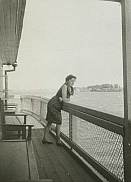
Inna at the boat trip on the Yenissei
The boat traveled slowly down the Yenisei. It was very quiet. The air smelled like water and sun. So much space! There was only untouched forest, the water, and the sky.
Inna and Sasha were on a journey down the Yenisei, toward the North Sea. Their destination was Norilsk: a city of eternal cold and unsetting sun.
Inna stood on the deck speaking to another woman passenger.
"We have been living in Norilsk for 20 years now," said the woman, "we're getting back from a vacation in the south".
"And you came to live in Norilsk out of your own free will?" Inna asked gingerly.
"We were sent here" laughed the woman. She was around 40, with a strong build. "I was sent here as a punishment. I was a thief once. I run away from home when my mother married a new husband, and got involved with a band of thieves. You don't believe me? Look at my arms." And she rolls up her sleeves and shows her tattoos, from wrist to shoulder.
"I was assigned to work as a log collector," She continued her story. "I stood in the ice-cold water of the Yenisei, fishing the wood logs that came down the river. It was hard. The water was freezing even in the summer, and we stood up to our waist in it. I ran away but got caught. After some time I managed to get a better job. When my time was up, I stayed in town, worked as a cleaning lady in the hospital."
Inna listened with interest to the lady's stories. The woman invited her and Sasha to sleep at her place in Norilsk. Norilsk was a small place. Gray houses stand on scaffolding dug deep into the frozen soil. There was not a shred of vegetation, but life and vodka were flowing on the main street. The shops were open all night, since there really was no night.
End chapter 16
A letter from Stavropol
The year was 1966. Nicolay got another apartment and started living separately.
Inna at her home when there was a ring at the door. Inna opened the door to a policeman.
"What is the matter?" She asked.
"Nothing special is the matter ", he answered. " I came to verify your identity. Someone is looking for you."
A few days later a letter arrived from Staravopol, addressed to Inna, from Valentina Gavrielovits, her parents' former neighbor and friend. The letter said "Dear Inna, come quickly, I have good news for you."
Inna flew to Stavropol and went to Valentina's house.
"Here is the address of your father". She said "he lives in Morocco. Your mother died a long time ago, and your brother died in the war in Czechoslovakia. Your father wants to see you. He hopes you can come visit him".
In March Inna received an official paper of invitation. To get permission to travel to Morocco she needed to collect the following documents: Affidavit, 2 long forms where she needed to specify every living relative she had, two autobiographies with explanations on how her parents ended up in Morocco, a notarized letter from her husband allowing her to leave, an authorization from the police, and a character description from her place of work, signed by the director, the Communist party representative and the vice president. Gathering all the documents took a few months.
One of the first papers she needed was an authorization from the husband.
"Why aren't you writing this authorization? Why is it taking you so long?" she asked Nicolay.
"I'm still thinking", was his reply, "I'm afraid this trip of yours is going to affect badly my situation at work; They'll say I'm in contact with immigrants, being married to a daughter of an Enemy of the People."
"What do you mean Enemy of the People? ", asked Inna, annoyed.
"If your father left the country he is the enemy of the people" Said Nicolay.
Inna walked away angry and insulted.
End chapter 17
Morocco
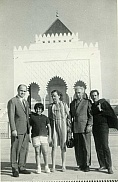
Morrocco. Inna, her father and friends.
Inna was very nervous when the plane began to descend in Rabat, Morocco. Her father waved at her as soon as she got off the plane.
"I recognized you immediately! I'm so happy to see you!" He cried. "Too bad mother did not live to see this day, oh, I won't talk about it...Don't cry..."
He motioned on a woman standing next to him. "Please meet mother's friend Anna Michailovna. She and her husband are also from Stavropol."
The car sped on a shining asphalt road stretching along the ocean. On the sides were strange houses with flat roofs and almost no windows. Everything was bright and vivid. After an hour's ride they arrived at the white city--Casablanca.
Inna's father lived in a small villa on the outskirts of town, on the ocean. In his small garden he raised grape vines, other fruit Inna did not know, and many flowers. Large dogs barked at them when they arrived. They sat down to a big feast and more friends arrived, many former Russians who came to hear from Inna how life in Russia was.
"How come they let you come here? I invited my daughter and they refused to let her visit!"
"I am afraid even to write to my son because I know they will harm him in some way for that..."
"No, says Inna," Times are better now, see: they let me come..."
"And in the stores, do you have products? Before the war we had to wait in line for everything"
"Well, we still have lines, but it's better than what it used to be".
"And the ones who dare come back to Russia, what happens to them? Do you know?"
Inna hesitated; the speaker answered his own question:
"They sent them away to camps or kill them, just so people in Russia won't know there is a better life".
"Yes, I know" said Inna. "I used to work in one of those camps."
For Inna It was like an amazing dream. The month with her father was engraved in her memory like a bright light spot.
When it was time to go, her father tried to convince her to stay with him, but she told him she could not live far from her children. She tried to convince him to come back to Russia, but he was too scared. They led many conversations.
"Yes", said Inna, "There are many terrible things in Russia, one can only move from one position to another with nepotism, nobody works and everybody steals from the government, but it's still my country." It was hard to say goodbye to her father, not knowing if she would ever see him again.
End chapter 18
Osip
"Mom! Look! Tanya is coming home with some guy!" cried Vera. Inna looked out the window and saw a taxi on the street. Out of it stepped Tanya and a handsome young man. Tanya walked in, hugged Inna and said "Mom, please meet my husband, Osip Preminger".
"Your husband?" exclaimed Inna," Congratulations!"
They sat and drank tea and Osip told her how he first met Tanya two years back on the lake Isikul, where she vacationed for the summer and he worked. He kept writing to her and finally she agreed to marry him. He said with a smile
"Mrs. Inna Vasilivna," he looked at her, "Do you know that I'm Jewish? How do you feel about that?"
"So what if you are?" said Inna, "I don't mind your nationality as long as you're a good honest guy. "
"Where do your parents live?" Inna asked him.
"My parents live in Bishkek, and before they lived in Siberia. They were deported after Russia took Romania, extending it a brotherly hand for help." He said with sacracsm. "My grandfather had a store, and he drunk the blood of the laborer, so they put him and his family on a one way ticket to Siberia. I myself was born there".
Inna was happy with her new son in law. Osip looked like an easy going, happy guy.
"We are going to live in little studio I got from the University, where I work on my final art project", said Tanya.
On a cold December morning Tanya gave birth to baby girl, who was named Tanya as well. Tanya completed her exams a few months after that.
In 1971 Vera, who studied physics, also graduated successfully.
What could Inna say when Tanya told her that she and Osip were going to immigrate to Israel? She said "It's your life. Do as you wish."
In the document for the authorities, which Inna had to give Tanya, she wrote:
"A person is free, free also to choose his domicile country".
When Nicolay found out about Tanya's plan, he was horrified. He still believed in the USSR regime, and for him this was the most horrible thing that could have happened.
"What! How can she do that?!" He was fuming. "Tanya got her education in this country. This is where she was brought up and raised, and how does she pay her country back? You've got to talk her out of it!" He shouted at Inna.
"I am not going to. Do it yourself if you like".
"You know she does not listen to me. This departure is going to harm us all. They won't accept Sasha to any university. It's your fault."
"Of course everything is my fault. Don't you ask yourself for a minute; why does it have to be like that? Why can't people just travel freely in this country? "
Nicolay did not give his daughter permission to leave. More than that, he renounced her and said he never wanted a thing to do with her again.
Early in the morning of May 12, 1972, Tanya and Osip left. To their farewell came Vera, Sasha, Inna and two of Osip's friends. Nicolay was not present.
End chapter 19
TECH-NO-LO-GY
On the paper Inna and Nicolay were still married, but in reality they were strangers to each other. Now all of Inna's love and concern concentrated on Sasha, her son, who was about to finish high school.
Sasha excelled in the exams at The Institute of Motor Engineering Technology, and got a good scholarship, which he spent entirely on records of American Pop music, which he got "under the floor", in mysterious ways.
In the winter, Inna's director sent her on mission to check up on the Technical process of a Factory for repair of electrical lifting magnets. The factory was in a small town away from Moscow. The production hall astonished Inna in its bad condition. It was freezing, the workers had to work with boots and gloves on to keep warm, and the wind blew through the hall. The ventilation system didn't work and clouds of a toxic yellow substance, a by-product of the process, floated in the room, blocking the workers' lungs.
Inna asked, "How come you workers did not complain to the management?"
"What do you mean, did not complain? We complained many times. They tell us: wait, the factory will go under reconstruction soon."
"You don't have a mess hall in the factory?"
"No, we bring our food from home. And there's not much to bring actually- the shops in this town are empty"
"So how are you dealing with this situation?"
"Everybody deals the way they can. If one can afford it, he drives to another town to get products. We wrote to the authorities, but they said that we already finished our products ration for the year, so we need to wait for next year."
Inna wrote all she heard and saw in the factory in her report. She wrote: "What can you expect from workers in those horrible conditions? How can one make plans of production and expect to meet deadlines if workers need to go and warm up every half hour?"
Her director was not happy with her.-"Why did I send you to the factory? To watch what the workers eat? I sent you to check up on the TECH-NO-LO-GY, TECH-NO-LO-GY, you understand me?"
"Yes, I understand, but one thing is affecting another. Workers conditions need to be taken care of. I bet the leadership doesn't know any of this?"
"Of course they know all this. Don't you get the way things work?"
Later Inna was summoned up to the head director.
"Was it you who sent an article to the newspaper about the Lesogorsk factory?"
"Yes, it was me."
"That's not good. You should've asked my permission".
On her break, Inna sat next to Victor Petrovich, her colleague. He was a decent honest, man. She trusted him. She told him about her trip and about the report.
"I know this factory", said Victor,"To you, it's news. You don't know that funds were allocated for this factory a long time ago, but they were spent on a new house for the director".
"What? It's common knowledge? I don't know about this? And the leadership knows about this?"
"Inna Vasilivna, how old are you? Don't you understand already that the leadership doesn't give a damn about the workers? I wrote to the leadership a few times myself and never even got an answer."
End chapter 20
Retirement
Inna went on retirement. She had worked for more than 30 years, raising 3 children. What did she have to show for her existence in the world? Nicolay was telling her "You didn't achieve anything in life. Look at me; I'm a doctor of technical science, and I write books. And you are a simple engineer, a teacher."
Her days were empty. She was bored and depressed. She walked in the park where she used to walk with Tanya and Sonya, her granddaughters. "Who needs me now? Nobody"¦"
Her father invited her again to Morocco. But how could she go? She did not live in a free country. She applied for permission and did not get an answer for months. She thought that they would probably deny her request this time, because her daughter went to Israel.
She was alone most of the time. Sasha had his own interests and Vera was living with her boyfriend, Oleg. Inna went to see Aunt Marusia, who had always been very kind and wise.
"Go to church", was her advice "You will feel better. Believe that God will always be with you, and will support you and comfort you."
"I am thinking about God a lot, aunt Marusia. I am trying to understand him, even though one cannot understand God, only believe in him."
"Yes, Inna, you are right"
"And do you believe in him?"
"Yes. And my husband was a believer too. To you, who grew up after the Soviet Revolution, it's hard to understand. But you can't kill faith. In the people, it will live forever".
"I don't know what to do, aunt Marusia. I feel like my mission here is done, my children grew up, I'm separated from my husband"¦"
When Inna came back home she found in the mail a rejection to her application to travel to Morocco. She went to the office to try and talk to the authorities.
"Why did you deny my request? You permitted me travel to Morocco twice. I presented all my life to you every time. And now, when my father is sick, you refuse to let me go."
"It's not my decision; it's the committee's decision". Said the clerk "The papers you presented are only valid for trips to Socialist countries. For a trip to Capitalist countries, they don't matter at all. "
"What should I do? Go to Israel? Will you let me go to Israel for a visit?"
"No".
"Then I'll have to go for good"¦"
End chapter 21
In Limbo
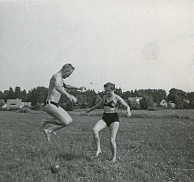
Nicolay and Inna
The year was 1973. A war had started between Israel and its surrounding Arab countries. The USSR was supplying the Arab coalition with arms, airplanes, and tanks.
Inna got an invitation to Israel from Tanya. She started collecting the necessary documents to apply to leave for Israel permanently.
In order not to need a letter of permission from her work, she quit her job.
Inna also asked Nicolay for an official divorce, since she knew he would never permit her to move to Israel. Nicolay was stubborn. He didn't want to give her a divorce, not because he loved her, but because he considered it inappropriate for distinguished Professors like himself to get a divorce.
"Okay then, sign permission for me to go to Israel!"
"What? Did you fall on your head? I will never sign such a thing. Think again about this nonsense." He said.
"Okay then, give me a divorce!"
"And what about Sasha?"
"What about him? He is a grown up and he has his own businesses. What is it to you anyway? We live in separate rooms, you go freely wherever you want"¦with whoever you want, I don't even ask"
"And you don't go where you want? You always did. In the course of our life together we lived together less than 6-7 years. It's your fault".
"And I think that was because of you! But why are we talking about the past now? What do you say about the future?"
"I'll think about it"¦"
Exactly 30 years after they married they got a divorce. Three months later, Inna got permission to travel to Israel.
At this time, Inna got a notice about the death of her father. He had fallen in the street. Now what? Should she go to Israel? Once she left, they would take her USSR passport and she would never be able to come back to Russia.
"Sasha', she said, "If you will ask me not to go, I won't go".
"Mom, look, it's your decision. I understand you. Don't worry about me. I'm a grown up."
Inna was torn apart and stressed, she couldn't decide. How was she going to get to Morocco from Israel? Those two countries didn't even have diplomatic relations. Inna got a telegram from her uncle--her father's brother--who lived in San Francisco. He suggested she could go to Vienna and wait there for papers he would send to her, which would permit her to travel to the USA.
It was another Moscow morning. People rushed to work, and traffic was heavy as usual. Sasha and Vera both came to the farewell. There was a drizzle of warm rain. Sasha wore jeans and a blue raincoat, Vera wore a Suede coat. Inna controlled herself. She did not cry, she believed. The half empty plane took off to Vienna. Down below remained Moscow, and Russia.
End chapter 22
Vienna
The plane landed in Vienna .Inna held her bag tight, jamming it to her chest. She entered the airport hall. Everything looked strange, unfamiliar, and unfriendly.
"Where are you going?" asked a young man. "To Israel? If you are going to Israel, we'll help you." Inna said,"No, I am going to America." But when a minibus arrived and everybody got on it, Inna did too. She did not know where else to go. She looked through the window at the lovely streets of Vienna, but couldn't enjoy them. "Dear God, what have I done? There is no way back now..." The bus dropped them off at a modest hotel and everybody was allocated a bed.
Inna called the organization her uncle recommended, the one that would help her get a USA visa and accommodate her while she waited for it. Her story touched them and they accepted her. She was given a place to live and 50 Shillings a day. That was enough for very modest meals and not much else. And so began long days of boredom, loneliness and misery in a foreign country.
One day, after receiving the daily allowance she was told she might have to wait 3-4 months more.
"What? Why so long? What am I going to do here? Can I at least visit Israel while I'm waiting?"
"No", they said "You can't leave Austria because you won't be able to come back. You have no passport".
Inna went back to her hotel room and cried and cried. There was no way out.
Endless days went by. She waited. Her only happy moments were when she got letters from her uncle in the USA or from Sasha and Vera. Finally she couldn't take it anymore and decided to go to Israel weather they would let her come back or not. She went to the "Sochnut" -"“the Jewish agency--and two days later she was on a plane to Israel.
End chapter 23
Israel
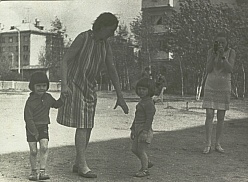
Inna with her granddaughters Tanya and Sonya
Inna was very happy to see Tanya, Osip and her granddaughters: Tanya, Sonya and Lea. She enjoyed spending time with her family and also did some sightseeing. She traveled to all the holy places where Jesus used to walk: Jerusalem, Nazareth, and Tiberius. "What an ancient land "“ and so many people lived here: Greek, Roman, Turks, Crusaders, Arabs, English"¦"
After two months Inna felt she needed to get back to her original plan; Morocco. There was unfinished business. She wanted to find out what had happened to her father. Friends wrote to her that his death was sudden and mysterious.
"Okay", Tanya said,"but you cannot go from Israel to Morocco, you need to go somewhere in Europe to ask for Visa. Where will you go?"
"Belgium, probably. It's the only country that allows entering its borders without a Visa."
"How will you live there by yourself, at your age? You'll be alone, think about it!"
"I know a foundation called "The Tolstoy Fund". They help Russian expats. If I stay in Israel, I will lose any hope of ever visiting Morocco."
End chapter 24
Belgium
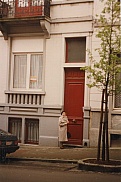
Inna at the entrance to her apartment in Brussels
Inna arrived to Belgium .When she got off the plane and didn't know what to do. She followed a group of people who spoke Russian to a minibus that picked them up. It turned out their destination was the "The Tolstoy fund". Inna followed. She got a small room in a hotel. Days went by again. Sunny days become rainy and gray. Inna walked the streets and narrow alleys, looking at the modern shops and the cafés, trying to understand the people.
In a newspaper store she met Valya Stpanova, also an immigrant from Russia, who became a good friend. Valya invited Inna to her home and introduced her to her husband, Boris Stepanov. Boris was blind as the result of an accident. He was an excellent conversationalist. Inna started visiting the family often. She read
Boris books and newspapers, or took walks with him. They liked to argue about philosophical questions.
Each day followed the other, but Inna became no closer to her goal-- Morocco. The only document she had on her was an "Israeli Temporary Right of Passage".
The more time she lost, the less chance she had of getting her father's inheritance. Her father's friends from Morocco wrote to her that her father's ex partner took over the property and the bank accounts. He, from his side, wrote to her and asked her to give him permission to act on her behalf in the financial matters.
"No, there got to be a way to solve this" Inna said
"Yes", said Boris Stepanov, "You can get married."
Inna laughed.
"Your situation is much better than ours was" Said Boris. "You got help. Nobody helped us. In Germany they were hunting us: the Russians, the English and the Americans. If we got caught we were sent to the USSR. And you know what was waiting for us there. You understand the paradox: people were afraid of their own country. We were in a camp. People slept. Suddenly men with guns surrounded us and everybody got captured. I and Valya managed to escape. We hid inside a grave. A grave saved our lives. Then we went to work in the coal industry. They accepted everybody. I worked very hard and in hazardous conditions. I got sick. Since I couldn't go back to work I started a business of furniture restoration. Everything went well, until the accident. Since then I'm a no man, a nobody."
Soon the fund stopped supplying accommodations. Inna found a small room under a roof on the fifth floor and a job as a cleaning lady.
Boris called Inna one day and told her to come immediately. She arrived. Three men sat near the living room table. One of them introduced himself as Nathan, and took a long look at Inna. They talk and drank, and Nathan said:
"Inna I need to tell you why I'm here. I came to get a wife. I'm tired of being alone. "
"A wife? Are you serious? But you don't know me at all!"
"It's okay, "he said' "I already decided you are suitable."
"Say yes, Inna!" said Boris, and raised his glass for a toast. "Cheers to the bride and groom! It's a good deal for you Inna. He is rich!"
"Marry me, and you'll get a passport like mine." Nathan said "You will be able to go everywhere."
Inna's eyes widened up. "I'll think about it." She said.
End chapter 25
Marriage
Days passed. Inna's longings for her children only became stronger. She reminisced about the time they were together. She remembered Sasha, going ice-skating in the winter. She remembered freezing days, sunny and bright. The cypress still slept, waiting for the spring. She remembered Gorky Park, where Inna and the girls would skate together. They would take each other by the hand and speed on the iced alley. There were no ice-skating rings in Belgium. The streets were crowded with people. They walked, rushed, hurried, shopped, and laughed.
Nathan kept calling her. She met him for coffee, but refused his repeated marriage proposals. He kept telling her she would have good life with him. He had money, as he received two pensions. She would be able to travel to Russia, to Morocco. Inna was not in love with him, but what else was she going to do?
Inna went to visit Nathan for a few days, to talk and see how life would be together. She imagined herself standing on the edge a high cliff, looking at the blue bottomless sea. She needed to jump. She was scared to death. She closed her eyes and jumped Holding her breath, she dove deeper and deeper. Would she ever surface?
A few weeks later, Inna went to live with Nathan, and the lawyer started working on their papers. Nathan liked to sit long hours in the local coffee shop, play cards and drink beer. Inna didn't get into it. She never felt at home. She liked to go to the beach nearby, running in the sand until she fell down exhausted, laying and looking at the endless waves going in and out, and at the flight of the birds in the blue sky.
Finally, she was summoned to the Advocate's office to get her Belgian Work Permit and Travel Card. In both documents it said "Nationality: Israel". All her efforts have been in vain. The Russian embassy and the Moroccan embassy refused give her a visa because of her nationality. Her daughter Vera went to the Ministry of Interior affairs office in Moscow to try to talk to them. They told her: "He, who left Russia with a visa to Israel, can never come back to Russia. And you, the children, can never leave Russia."
Inna was devastated. What a grave mistake she had made! Never again would she see her son or her daughter. This was heartless! Even criminals have the right to see their children. Who could help her now?
The marriage with Nathan didn't go well. He did not allow her to see friends, and was very possessive of her. One day, as she was studying French with her male teacher, Nathan came home drunk. In a fit of jealousy, he tried to stab her with a knife.
Inna ran away from home and wandered the streets. A light rain started. Where could she go? On the other side of the street was a Police station. Inna went in and told them about the attack.
End chapter 26
Divorce
The state of Belgium gives free legal counseling to those who can't afford it. Inna got an attorney to work on the divorce. Meanwhile, she contacted the Tolstoy fund and they helped her again by finding her a place to live. She continued her previous life; working as a cleaning lady, reading many books, taking to French classes, visiting Boris and Valya Stepanov. She made friends with her neighbors, Anton and Manuela, from Portugal.
"Why are you so happy?" Anton asked her one night as she came home "Did you get a Belgium passport?"
"No"
"A visa to Morocco?"
"No"
"So what is it?
"My daughter in Moscow gave birth to a healthy baby boy. I am now a grandmother again! Although I will probably never see the baby" she added.
Against all odds, Inna eventually got a Visa to Morocco. She went for a few weeks. With aid from friends, she got some of her father's money. The majority was left in the hands of his dubious ex-partner, Alexander. Still, Inna could now afford to travel to the USA and visit her uncle Vasily in San Francisco.
End chapter 27
Epilogue
In the spring of the same year, Inna got a visa to Israel and her divorce papers. She went Israel, where she lived for 12 years.
With the beginning of the Perestroika (What a happiness that was for her!) she went back to Russia. Not because she had bad life in Israel, but because she missed her children and the gray sky of Moscow. She found her homeland totally different, but was it for the better?
End chapter 28
In memory of my beloved Grandma
Inna, my grandmother died last year. We were close and I miss her. I edited her book of memoirs to create the following story.
End chapter 29
|
|

